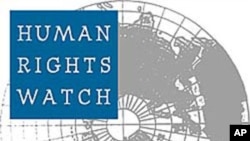In a new report, Human Rights Watch sharply criticizes Russia and China for blocking action on Syria in the U.N. Security Council and takes aim at other countries that it says have also been obstacles to stopping the 10-month violent repression in Syria.
The annual human rights review of more than 90 countries highlights the spread of the Arab Spring democratic movement and urges the international community to give strong support to the countries in North Africa and the Middle East that are seeking democratic reform, instead of backing autocrats who have kept oil exports flowing.
In its report, the monitoring group Human Rights Watch criticizes some Western governments for being slow in challenging former Egyptian President Hosni Mubarak until it was clear he would have to step down. The group also says there has been little real pressure on Bahrain’s government for having crushed its democracy movement. And in Yemen, the rights group expressed disappointment that Western countries accepted a plan that includes immunity for outgoing President Ali Abdullah Saleh.
Human Rights Watch reserved its strongest criticism for the events in Syria, where the government of President Bashar al-Assad has brutally put down anti-government protests.
The rights group says the ongoing repression has undermined the few reforms President Assad has enacted. The report details large-scale military operations on several towns and the arbitrary arrest, torture and murder of thousands of citizens.
Speaking at the United Nations launch of "World Report 2012," Human Rights Watch's U.N. Director Philippe Bolopion singled out Russia and China, which used their Security Council veto in October to prevent a resolution on Syria. “We think they really bear a huge responsibility. Over 3,000 people have been killed in Syria since the two countries cast their vetoes to block any council action. And we still have not had a single resolution on Syria, despite more than 5,000 people being killed," he said.
Bolopion said Russia’s actions are especially disturbing because they can be seen to be contributing to the escalation of violence in Syria. He pointed to recent media reports about a Russian ship carrying ammunition that docked in the Syrian port of Tartus and another report that Moscow has signed a half-billion dollar deal to sell 36 fighter jets to Damascus.
“Russia has presided over really what have been half-hearted attempts at negotiating a weak [Security Council] resolution over the last few weeks. And in the meantime, Russia has continued selling and delivering weapons to Syria, which is really an insult to the Syrian people who are at the receiving end of these weapons," he said.
Bolopion also criticized India and South Africa, which are non-permanent members of the U.N. Security Council, and Brazil, which recently completed a two-year council term in December, for their positions on Syria. All three abstained on the Syria resolution that Russia and China vetoed in October. Bolopion called that a “profound mistake."
“For countries who are emerging powers, who are countries who have a pretty decent record on human rights at home, it is extremely disturbing to see in the Security Council they have been siding with Russia and China on this," he said.
For months, the Security Council has been divided over what to do on Syria.
On Sunday, the Arab League called on the U.N.’s most powerful body to support its initiative to end the violence. The plan calls for President Assad to transfer power to a deputy and allow the formation of a national unity government with the opposition within two months. The new government would be responsible for organizing parliamentary and presidential elections under Arab and international supervision. The Syrian government has rejected the plan.
Rights Group Criticizes Some Countries for Letting Syrian Crackdown Continue




